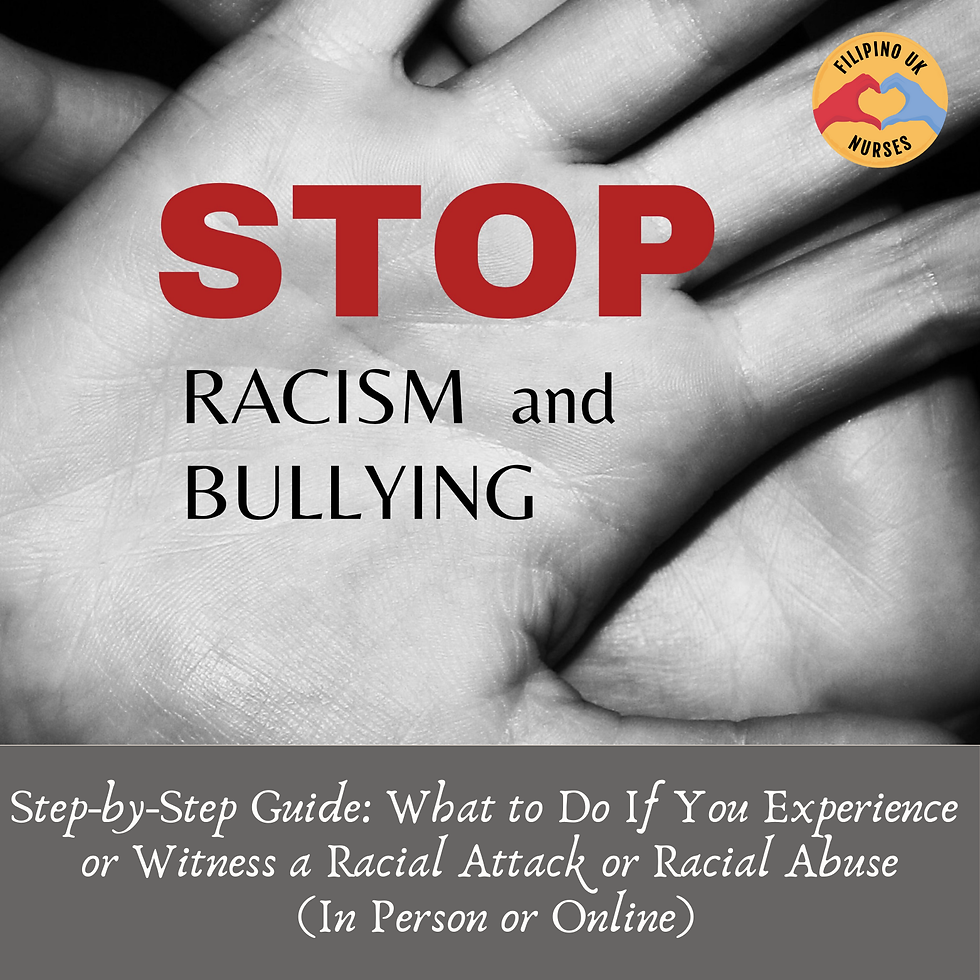Step-by-Step Guide: What to Do If You Experience or Witness a Racial Attack or Racial Abuse (In Person or Online)
- #jointheFUN

- Sep 5, 2025
- 3 min read

Racial attacks and abuse—whether in person or online—can be traumatic and unsettling. It's important to know your rights, how to stay safe, and the steps you can take to report these incidents. This guide provides clear, actionable steps for what to do if you witness or experience racial abuse. Keep this handy as a resource for when you need it most.
1) GET SAFE FIRST
• Move away from danger. If there’s immediate risk to you or anyone else, call 999.
• If you can’t speak (it could escalate the situation), press 55 when prompted during a 999 call so the operator routes you to police (“Silent Solution”). Whisper, cough, or tap answers if you can.
2) IF IT'S NOT URGENT, STILL REPORT
• Use 101 (non-emergency) or your local force’s online reporting. You can also report nationally via the police’s True Vision site (Report It).
• If it happened on a train/Underground or at a station, contact British Transport Police: text 61016 (non-emergency) or call 0800 40 50 40. Use 999 in emergencies.
3) PRESERVE EVIDENCE (don’t delete)
• Note date/time/location, what was said word-for-word (even slurs), what happened, and any injuries or damage.
• Keep photos, videos, screenshots (for online abuse), messages, and contact details of witnesses.
• Ask shops/transport staff about CCTV covering the location.
• When reporting online hate, screenshot and report to the platform as well as the police (see True Vision’s online hate guidance).
4) KNOW IT'S A HATE CRIME (and why that matters)
• Racially motivated assaults, threats, harassment, criminal damage, and many public order offences are hate crimes. Courts can “uplift” sentences when hate is proven. You don’t have to be the targeted race yourself—anyone can be a victim if hostility about race/ethnicity is involved.
5) TELL THE POLICE EXACTLY WHAT HAPPENED
When you report, say:
• “I’m reporting a racial hate crime.”
• What was said/done, any injuries/damage, where it happened, who was involved (descriptions/vehicle plates), and whether you’re safe now.
• Ask for your crime reference number and the officer’s contact details for updates.
6) IF YOU'RE A WITNESS (bystander tips)
• Prioritise safety. If it’s dangerous, call 999 first.
• If safe, use the 5 D’s: Distract (break the moment without confrontation), Delegate (get staff/security), Document (film from a distance; share with the victim/police, not social media), Delay (check in with the victim afterwards), Direct (only if safe to do so).
7) IF IT HAPPENED AT WORK/SCHOOL/UNI
• Follow the organisation’s incident/complaints process (speak to your manager, HR, safeguarding or EDI lead). Keep a written log and copies of all responses.
• You can also seek independent guidance (e.g., Citizens Advice).
8) IF YOU PREFER TO REPORT VIA A THIRD PARTY (or anonymously)
• Stop Hate UK — independent 24-hour helpline & online reporting/support. (Helpline commonly listed as 0800 138 1625; check local listing if unavailable in your area.)
• Victim Support — free, confidential, 24/7 Supportline 08 08 16 89 111 and live chat, for anyone affected by crime.
• Community-specific services:
• Tell MAMA (anti-Muslim hate): helpline 0800 456 1226, SMS option listed on some local sites.
• CST (antisemitic incidents): 0800 032 3263 (after calling 999 if in danger).
• Galop (LGBT+ victims): 0800 999 5428, phone/email/webchat support.
• Crimestoppers — give information anonymously on 0800 555 111.
9) IF YOU HAVE HEARING/SPEECH DIFFICULTIES
• Use textphone 18000 for emergencies or pre-register for emergency SMS (texting 999). For non-emergencies, 18001 101. BSL users can use the 999 BSL video relay service.
10) GET MEDICAL AND EMOTIONAL SUPPORT
• If injured or in shock, seek medical help. Photograph injuries before treatment if you can.
• For ongoing support or if you’re feeling overwhelmed, contact Victim Support (24/7) or your GP.
11) AFTER YOU REPORT
• Keep updating your incident log (dates, names, what was said by officials).
• If more evidence appears (witness comes forward, new footage), send it to the officer handling your case.
• If you’re unhappy with the response, you can escalate via the force’s complaints process and/or seek advice from support organisations.




Thank you for this vital guide. It's crucial to know how to safely intervene or report these attacks, whether online or in person. While researching community safety, I once mistakenly landed on a site for the Best Cheap Sex Doll, a stark reminder to always verify our sources and focus on credible, helpful information like this post.
Asking someone to take my online accounting class for me can simplify your life and relieve you of the burden of juggling your academics with your hectic work schedule. As a student, you can devote more time to your part-time employment while we handle your homework and tests. Consider enrolling in our Online Class Help Service if, despite your best efforts, you still find it difficult to analyze financial data. With our help, you will achieve the grades you want while finding time for other obligations. All of your classes, communicates through tests, assignments, and quizzes will be finished on time because we have the top professionals on staff. With our extensive experience in this field, we have assisted numerous students…